| Srl | Item |
| 1 |
ID:
191851
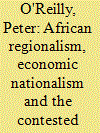

|
|
|
|
|
| Summary/Abstract |
Over the last decade, a new developmentalism has taken root across Africa, centred on promoting local production and industrialisation. One unintended consequence of this has been the proliferation of economically nationalist policy measures that have increasingly come into tension with the aims of regional integration in Africa. This article sets out to offer insights as to why these tensions are emerging by focusing on the East African Community (EAC) and the growing trend of economic nationalism among its members. Contrary to what rationalist and structuralist accounts might presume, this article argues that this rise in economic nationalism is instead reflective of a weakening of the discursive imperative – or social purpose – that had initially converged various actors around the EAC's integration agenda when revived in 2000. While drawing from the EAC's experience, it concludes by highlighting a broader legitimacy dilemma facing African regional organisations within this ‘new developmentalism’.
|
|
|
|
|
|
|
|
|
|
|
|
|
|
|
|
| 2 |
ID:
173803
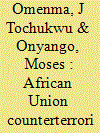

|
|
|
|
|
| Summary/Abstract |
Attacks from violent extremist organisations have reached unprecedented levels in Africa. Boko Haram, al-Shabaab, al-Qaeda in the Islamic Maghreb and Islamic State and Sinai Peninsula activities account for the majority of high attacks and fatality rates. Their membership cuts across national borders; some have established a presence in local communities, while others are controlling territories in a number of states. This continues to happen despite regional measures such as the Algiers Plan of Action on the Prevention and Combating of Terrorism (2002) and the African Model Anti-Terrorism Law (2011) to contain the activities of violent extremist groups on the continent. The prevailing argument shows that the African Union has initiated several legislations and protocols to contain terrorism on the continent, but the Union lacks the capacity to enforce legislations. Relying on the cost–benefit theoretical explication, we conclude that member states of the East African Community prefer to partner with external organisations in counterterrorism programmes which result in conflicting cross-border rules and challenges in countering violent extremism in Africa.
|
|
|
|
|
|
|
|
|
|
|
|
|
|
|
|
| 3 |
ID:
172348
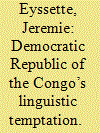

|
|
|
|
|
| Summary/Abstract |
The aim of this article is to assess whether the Democratic Republic of the Congo (DR Congo) is likely to upgrade the status of English by constitutional or educational means. Indeed, neighboring countries such as Rwanda and Burundi adopted English as their official language in 1996 and 2014, but less writing in English is devoted to a potential linguistic transition in DR Congo, the most populous French-speaking country. This article will gauge DR Congo and Rwanda against the four criteria that arguably triggered Rwanda’s switch-to-English: historical factors in current linguistic trends; the role of charismatic leaders in sudden language policy changes; language-in-education policies; and economic incentives. The results of this interdisciplinary investigation into the language dynamics of the Great Lakes region indicate that, reflecting the vehicles of DR Congo’s domestic and regional evolutions, its leaders might be tempted to enhance the status of English as an official language in a way that, contrary to Rwanda’s radical switch-to-English, is more compatible with other languages.
|
|
|
|
|
|
|
|
|
|
|
|
|
|
|
|
| 4 |
ID:
115209
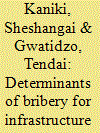

|
|
|
|
|
| Publication |
2012.
|
| Summary/Abstract |
Existing empirical evidence suggests that corruption in infrastructure is prevalent in developing countries. Using data on manufacturing firms in Kenya, Uganda and Tanzania, this study investigates what type of firms are asked to pay bribes by public officials in order to access infrastructure. We find that firms in Tanzania and Uganda face more severe problems with infrastructure than those in Kenya. Despite facing fewer infrastructure constraints, we find that Kenyan firms are more likely to be asked for bribes than Ugandan and Tanzanian firms; suggesting that paying bribes could be enabling Kenyan firms to access limited infrastructure. We also find that larger firms are less likely to be asked for bribes, and that an efficient court system reduces the propensity of public officials to ask for bribes. In addition, firms located in capital cities are more likely to be asked for bribe payments. These findings provide policy makers with specific targets to aim for in the design of policies meant to address corruption in infrastructure provision.
|
|
|
|
|
|
|
|
|
|
|
|
|
|
|
|
| 5 |
ID:
111766
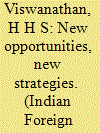

|
|
|